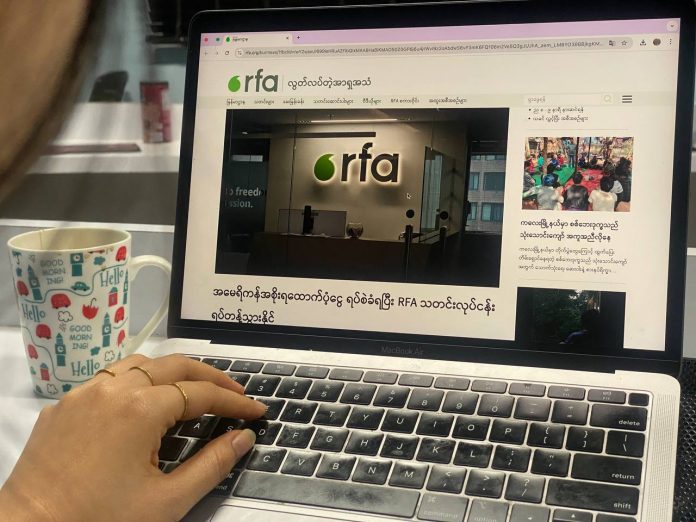Guest contributor
James Shwe
The recent operational pause of Voice of America (VOA) and Radio Free Asia (RFA) Burmese language services, following a U.S. government review of federal agency funding, has sparked important discussions about the role of independent media in regions where press freedom is under siege.
As the U.S. recalibrates its global media engagement to meet emerging challenges, this moment highlights a pivotal opportunity for democratic nations worldwide to unite in supporting access to truthful information and humanitarian aid for Myanmar—particularly in the wake of the devastating March 28 earthquake and the military junta’s ongoing repression.
The role of independent media in Myanmar
For decades, VOA and RFA have provided millions in Myanmar with uncensored news, offering a critical counterbalance to state-controlled narratives.
Their reporting on human rights abuses, governance, and regional affairs has empowered communities to make informed decisions, even as the junta tightened censorship after the 2021 coup.
The temporary suspension of these services, pending legal and congressional review, underscores the need for robust international collaboration to ensure continuity in truthful reporting.
A federal judge recently ordered the restoration of funding for VOA and RFA, reaffirming their congressionally mandated mission to deliver “accurate, objective, and comprehensive” journalism.
This legal victory reflects bipartisan efforts to preserve essential tools of U.S. soft power, which have long fostered global trust in democratic values.
Myanmar’s dual crisis: Earthquake and authoritarian control
The devastating March 28 earthquake, which killed thousands and displaced millions, has compounded Myanmar’s humanitarian and political crises.
The junta has restricted aid to resistance-held areas, diverted relief funds to military operations, and staged propaganda campaigns to legitimize its rule.
Meanwhile, China has expanded its influence, pressuring ethnic armed organizations to surrender key territories and flooding Myanmar’s information space with state-backed narratives.
Propaganda and disinformation have become central to the junta’s strategy, distorting public opinion and undermining resistance efforts. While Myanmar’s majority population remains firmly opposed to military rule, an increasingly fractured information ecosystem has left many vulnerable to manipulation.
Investment in critical thinking education, paired with broader media access, can help empower citizens to dismantle authoritarian narratives and strengthen national unity. However, these efforts must be accompanied by strategies addressing tech platform accountability, media freedom, and grassroots mobilization.
China has further complicated Myanmar’s path to democracy by providing diplomatic cover for the junta’s planned sham elections, widely condemned as a facade to entrench military rule.
This approach enables Beijing to prolong the conflict while securing strategic advantages, such as preferential access to Myanmar’s resources and infrastructure projects under the Belt and Road Initiative.
In this environment, the international community faces an urgent responsibility: to ensure humanitarian aid reaches those in need and to prevent authoritarian narratives from dominating the discourse.
A call for global democratic solidarity
The U.S. has historically been a leader in supporting democracy and human rights in Myanmar, providing more than $400 million USD in assistance since the 2021 coup. As Washington reevaluates and strengthens its global media strategy, democratic partners can reinforce these efforts by:
- Emergency support for independent media:
Democracies such as the E.U., Japan, South Korea, and others should provide transitional funding and technical assistance to sustain alternative and local Burmese media outlets. Initiatives already proposed by countries like the Czech Republic and Germany to support independent journalism offer a promising model. - Humanitarian aid through trusted channels:
International donors should prioritize partnerships with Myanmar’s National Unity Government (NUG), ethnic organizations, and civil society groups to deliver earthquake relief directly to communities, bypassing junta-controlled distribution networks. - Countering authoritarian disinformation:
Democracies must invest in Burmese-language media initiatives to counter the growing dominance of Chinese state outlets such as Xinhua and China Radio International (CRI), which now produce more Myanmar-focused content than any other foreign broadcasters. - Diplomatic pressure on the junta:
The Association of Southeast Asian Nations (ASEAN), the U.N., and other international actors must intensify demands for humanitarian ceasefires and accountability for aid obstruction, while urging China and others to respect Myanmar’s sovereignty and democratic aspirations.
Why this matters for democracy
The people of Myanmar continue to aspire to values of transparency, accountability, and self-determination—principles that resonate deeply with all democracies. As global media dynamics shift, international solidarity can ensure that access to truthful reporting and life-saving aid remain steadfast pillars of support for Myanmar’s democratic resistance.
The restoration of VOA and RFA, as mandated by U.S. courts, will be critical to these efforts. As RFA President Bay Fang rightly stated: “Our audiences deserve access to facts, not propaganda.”
By working together, democracies can uphold this vision and ensure Myanmar’s people are not left in the dark.
James Shwe is a Myanmar democracy activist in the U.S. and is a member of the advocacy groups Free Myanmar and the Los Angeles Myanmar Movement. He has been trying to organize and motivate the Myanmar diaspora to advocate for democracy in Myanmar.
DVB publishes a diversity of opinions that does not reflect DVB editorial policy. We’d like to hear what you think about this or any of our stories: [email protected]



